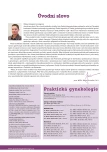-
Medical journals
- Career
Some bioethical questions in assisted reproduction – review of literature (Strassbourg convention, human embryo status).
Authors: L. Pilka 1,3; D. Rumpík; R. Pilka 1; M. Koudelka 2 3
Authors‘ workplace: Klinika reprodukční medicíny a gynekologie, Nemocnice U lomu 5, Zlín 1; Klinika gynekologie a porodnictví, FN a LF PU Olomouc 2; Reprofit International, s. r. o., Hlinky 122, Brno 3
Published in: Prakt Gyn 2009; 13(2): 85-90
Overview
The introduction and development of assisted reproduction techniques during the second half of the 20th century represent one of the biggest achievements in the medicine. In vitro fertilization is a fertility procedure which first succeeded as recently as 1978 by Dr. Edwards and Dr. Steptoe when resulted in the birth of Louise Brown in England. Since then the technology has been further refined and developed by physicians all over the world. Nevertheless, after the first enthusiasm has passed many ethical, legal and social aspects of these mehods have been discussed by physicians, public and administration. Serious discussions and frequent disputes included different religious views as well. Today, the embryo status, gamete donation, surrogacy, cryopreservation of human embryo, pre‑embryonal research and gamete manipulation are the main ethical issues in question.
Key words:
assisted reproduction – bioethical questions – Strassbourg convention – human embryo status
Sources
1. Munzarová M. K etickým aspektům asistované reprodukce. Praktický lékař 1998; 78(4): 193–195.
2. Pilka L. Status embrya z hlediska asistované reprodukce. Sborník k interdisciplinární konferenci Status embrya. Brno 1999.
3. Anon. Ethical considerations of assisted reproductive technologies. By the Ethics Commitee of the Am Fert Soc Fertil Steril 1994; 62: 1.
4. Holm S. The Moral Status of the Pre‑Personal Human Being. Conceiving the Embryo. In: Evans D (ed). Hague: Martinus Nijhoff Publishers 1996 : 193.
5. Keating B. Statut de l`embryon. Les mots de la bioéthique. In: Hottois G, Parizeau MH (eds). Bruxelles: de Boeck Université 1993 : 320.
6. Pilka L et al. Vorschlag der ethischen Grundsätze der extrakorporelen Befruchtung und der damit zusammenhängenden Fragen in der Tschechoslowakei. In: Report, 8th World Congress of Medical Law, Prague 1988 : 257.
7. Svojanovská K, Pilka L. Mezinárodní konsensus IFFS o asistované reprodukci. Plánování rodiny a reprodukční zdraví 1998; 1 : 36 (1. část), 1 : 66 (2. část).
8. Lajkep T. Přehled základních přístupů k určení morálního statutu lidského embrya. Čes Gynek 2000; 65(6): 483–486.
9. Prudil L. Status lidského embrya v českém právu. Sborník interdisciplinární konference LF MU. Brno 5.–6. 11. 1999.
10. Vališová V. K některým otázkám asistované reprodukce z pohledu současné právní úpravy. Zdravotnictví a právo 1999; 7–8 : 13–19.
11. Štěpán J. Právo a moderní lékařství. Praha: Panorama 1989 : 205.
12. Figo Commitee for the study of ethical aspects of human reproduction and women’s health. Ethical Issues in Obstetrics and Gynecology. London: FIGO 2006 : 288.
Labels
Paediatric gynaecology Gynaecology and obstetrics Reproduction medicine
Article was published inPractical Gynecology

2009 Issue 2-
All articles in this issue
- Perioperative adhesion prevention in gynaecology.
- Adenocarcinoma in situ of the uterine cervix – analysis of 10 cases
- Thyroid cancer therapy with radioiodine 131I, the impact on gonadal functions and fertility.
- Some bioethical questions in assisted reproduction – review of literature (Strassbourg convention, human embryo status).
- Pregnancy loss after the assisted reproductive technologies.
- Intrahepatic cholestasis of pregnancy and treatment with ursodeoxycholic acid.
- Identification of the estrogen alpha receptor in normal endometrium and in clear cell carcinoma
- Forensic Aspects of Assisted Reproduction in Czech and Slovak Legislation
- Practical Gynecology
- Journal archive
- Current issue
- Online only
- About the journal
Most read in this issue- Intrahepatic cholestasis of pregnancy and treatment with ursodeoxycholic acid.
- Pregnancy loss after the assisted reproductive technologies.
- Thyroid cancer therapy with radioiodine 131I, the impact on gonadal functions and fertility.
- Perioperative adhesion prevention in gynaecology.
Login#ADS_BOTTOM_SCRIPTS#Forgotten passwordEnter the email address that you registered with. We will send you instructions on how to set a new password.
- Career

